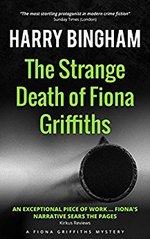 The Strange Death of Fiona Griffiths
The Strange Death of Fiona Griffiths
by Harry Bingham
Series: Fiona Griffiths, #3Kindle Edition, 470 pg.
Sheep Street Books, 2015
Read: February 16 – 17, 2018

From the instant that it was mentioned in Love Story, With Murders that Fi Griffiths had signed up for a course in Undercover work, every reader knew that she’d end up doing some deep undercover work soon. Thankfully, Bingham didn’t make us wait too long because here comes both the course and the assignment. But before we get to the assignment, Fi gets this wonderful reality check after her course:
I’m tasked to process paperwork on a couple of cases that are coming to court. Someone assigns me to help on a team that is developing advice on how to avoid thefts from vehicles. The first of our meetings takes an hour and forty minutes and the gist of our advice will be, ‘Lock your car and hide your valuables.’ Or, to simplify further, ‘Don’t be a bloody idiot.’
I suggest that as a slogan and everyone looks at me.
I just loved that. Anyway, this seems like a perfect idea — there’s a real sense in which everyday life is an undercover assignment for Fi, letting her do it as part of her job seems like a no-brainer. Not that her superiors really understand that, but her readers do.
The case started off as a simple payroll fraud investigation — a clever and ambitious fraud, make no mistake, but not the kind of things that excites any police detective (especially one like Fi). But then, she ties one suspicious death into this crime — and then a particularly gruesome murder as well. These discoveries are enough to get The Powers That Be to take this seriously enough to put Fi and another officer undercover as payroll clerks to infiltrate this scheme. Eventually, Fi is recruited by the people they’d hoped recruit her and the game is afoot. Fi does things that will surprise the reader as much as they do to her targets in her efforts to bring some justice to the situation.
At some point, Fi is going over the results of her work thus far with our friend, DCI Jackson, and her handler from Organized Crime
Brattenbury says, ‘Fiona, this is remarkable work. You—’
Jackson interrupts him. ‘Don’t flatter her. She’ll cock everything up. Or start shooting people.’
Which is essentially the outline for every Fiona Griffiths novel, really.
Watching Fi go deeper into her cover and into the fraud activity is gripping — and also very different from the earlier books. Fiona doesn’t get to spend as much time with the dead as she likes, she can’t have their pictures on display without ruining her cover. It doesn’t stop her from doing what she can along those lines, but it gives Strange Death a different feel from its predecessors.
Fi’s investigation of the deaths isn’t the focus of this novel, it’s her undercover work — how she does it, how she embodies her cover, how as her cover she contributes to the community, how she learns things that can help her (both the fictional her and the real). Like too many who go undercover, Fi arguably gets too close to her targets (it’s not much of an argument, really), and lines between the detective and the felonious payroll clerk blurred more than they should’ve. The same kind of focus, the same kind of attachment she makes to the victims in the other books (and cases we don’t have record of) is brought to the people and work she encounters here.
At the same time, Fi’s desire — need — for the emotional, familial and romantic connections she’s made has never been stronger. Those things that she wanted, so she can be more like a citizen of “Planet Normal,” act as an anchor to reality in a way that has to surprise her. Not only that, she forges new relationships as DC Griffiths through these events. Minor spoiler: the Fiona Griffiths that emerges from this assignment is a noticeably different, more well-rounded, and changed in other (less pleasant) ways.
It was good to see DCI Jackson at work again. The other police officers (particularly Brattenbury and his team) were more interesting than we’ve gotten before. The same could and should be said for the other supporting characters we encounter in these pages — criminal and civilian alike. I hope that Bingham is able to find ways to bring many of these characters back in future novels (or he can just give us new characters that are as well constructed, but I like so many of these I’d prefer to see them).
I’m a sucker for undercover cop stories — since the first time I saw Ken Wahl’s Vinnie Terranova (when I was too young to be seeing such things) and what his work did to him. This was no exception — and a strong sample of the type. This story of Fiona Griffiths’ UC work is just as gripping, just as surprising as you could want and a sure sign that this character is more than a one-trick pony (if anyone was still wondering) and that Bingham is a writer to watch.
—–


